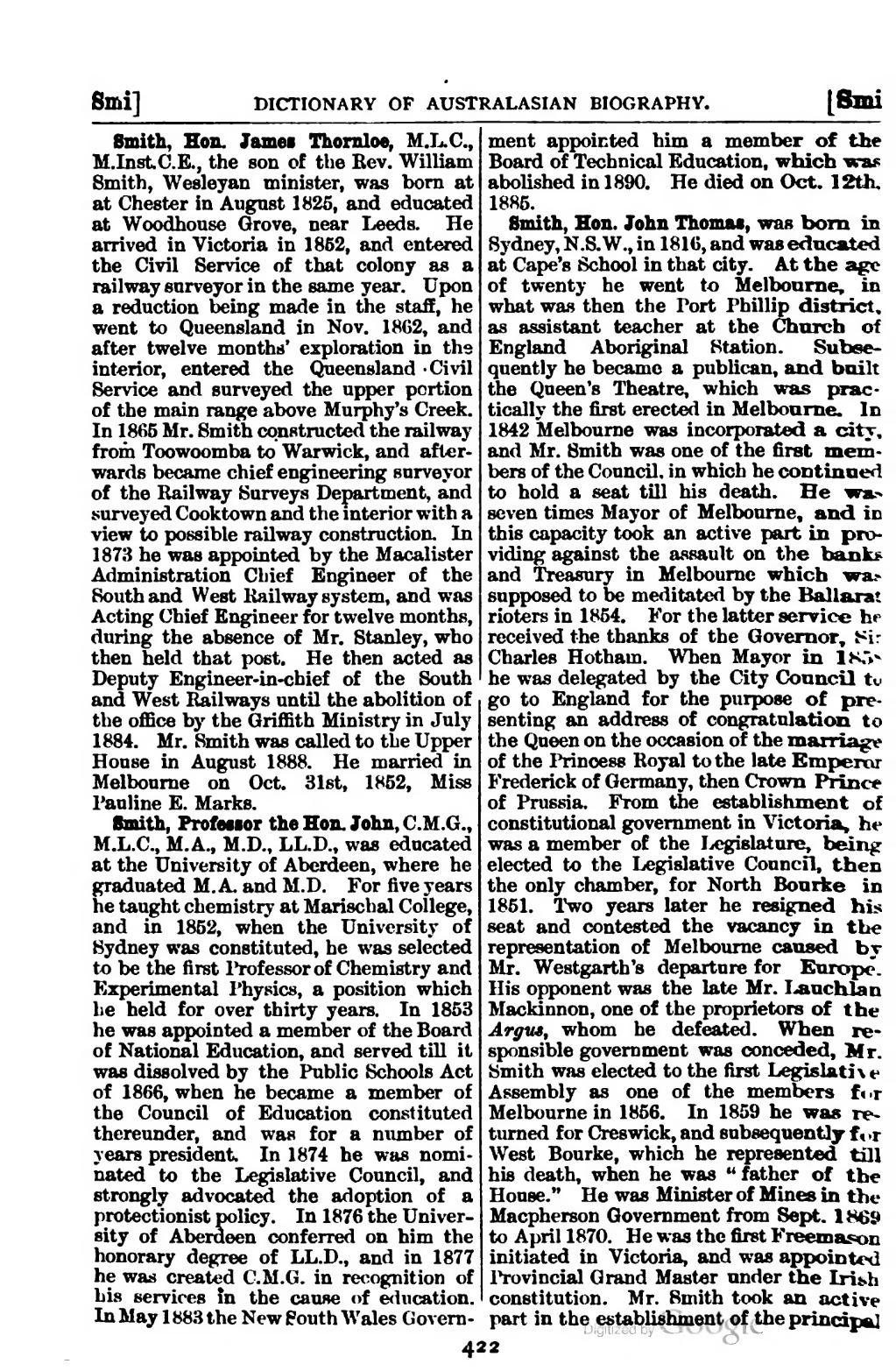Smith, Hon. James Thornloe, M.L.C., M.Inst C.E., the son of the Rev. William Smith, Wesleyan minister, was born at at Chester in August 1825, and educated at Woodhouse Grove, near Leeds. He arrived in Victoria in 1852, and entered the Civil Service of that colony as a railway surveyor in the same year. Upon a reduction being made in the staff, he went to Queensland in Nov. 1862, and after twelve months' exploration in the interior, entered the Queensland Civil Service and surveyed the upper portion of the main range above Murphy's Creek. In 1865 Mr. Smith constructed the railway from Toowoomba to Warwick, and afterwards became chief engineering surveyor of the Railway Surveys Department, and surveyed Cooktown and the interior with a view to possible railway construction. In 1873 he was appointed by the Macalister Administration Chief Engineer of the South and West Railway system, and was Acting Chief Engineer for twelve months, during the absence of Mr. Stanley, who then held that post. He then acted as Deputy Engineer-in-chief of the South and West Railways until the abolition of the office by the Griffith Ministry in July 1884. Mr. Smith was called to the Upper House in August 1888. He married in Melbourne on Oct. 31st, 1852, Miss Pauline E. Marks.
Smith, Professor the Hon. John, C.M.G., M.L.C., M.A., M.D., LL.D., was educated at the University of Aberdeen, where he graduated M. A. and M.D. For five years he taught chemistry at Marischal College, and in 1852, when the University of Sydney was constituted, he was selected to be the first Professor of Chemistry and Experimental Physics, a position which he held for over thirty years. In 1853 he was appointed a member of the Board of National Education, and served till it was dissolved by the Public Schools Act of 1866, when he became a member of the Council of Education constituted thereunder, and was for a number of years president. In 1874 he was nominated to the Legislative Council, and strongly advocated the adoption of a protectionist policy. In 1876 the University of Aberdeen conferred on him the honorary degree of LL.D., and in 1877 he was created C.M.G. in recognition of his services in the cause of education. In May 1883 the New South Wales Government appointed him a member of the Board of Technical Education, which was abolished in 1890. He died on Oct. 12th, 1885.
Smith, Hon. John Thomas, was born in Sydney, N.S.W., in 1816, and was educated at Cape's School in that city. At the age of twenty he went to Melbourne, in what was then the Port Phillip district, as assistant teacher at the Church of England Aboriginal Station. Subsequently he became a publican, and built the Queen's Theatre, which was practically the first erected in Melbourne. In 1842 Melbourne was incorporated a city, and Mr. Smith was one of the first members of the Council, in which he continued to hold a seat till his death. He was seven times Mayor of Melbourne, and in this capacity took an active part in providing against the assault on the banks and Treasury in Melbourne which was supposed to be meditated by the Ballarat rioters in 1854. For the latter service he received the thanks of the Governor, Sir Charles Hotham. When Mayor in 1858 he was delegated by the City Council to go to England for the purpose of presenting an address of congratulation to the Queen on the occasion of the marriage of the Princess Royal to the late Emperor Frederick of Germany, then Crown Prince of Prussia. From the establishment of constitutional government in Victoria, he was a member of the Legislature, being elected to the Legislative Council, then the only chamber, for North Bourke in 1851. Two years later he resigned his seat and contested the vacancy in the representation of Melbourne caused by Mr. Westgarth's departure for Europe. His opponent was the late Mr. Lauchlan Mackinnon, one of the proprietors of the Argus, whom he defeated. When responsible government was conceded, Mr. Smith was elected to the first Legislative Assembly as one of the members for Melbourne in 1856. In 1859 he was returned for Creswick, and subsequently for West Bourke, which he represented till his death, when he was "father of the House." He was Minister of Mines in the Macpherson Government from Sept. 1869 to April 1870. He was the first Freemason initiated in Victoria, and was appointed Provincial Grand Master under the Irish constitution. Mr. Smith took an active part in the establishment of the principal
422
